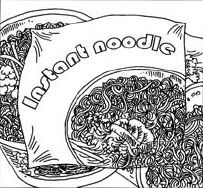Thou shalt not collude on pricing
Updated: 2007-08-20 07:03
Thou shalt not collude on pricing, the regulatory god said unto the Moses of industries in most countries, including China. But the instant noodle cabal either did not hear it or turned a deaf ear.
In late July, noodle makers joined forces in raising prices by about 20 percent, and as much as 40 percent for some products.

After less than three weeks of regulatory pressure, media assailing and public discontent, the industry backed down, apologized and initiated an across-the-board price cut.
Is this a triumph of consumer rights and regulatory protection?
Yes ... hmm maybe.
Instant noodle is more than the Chinese equivalent of the Western television dinner. The busy or lazy depend on it; the nation's gigantic floating population is buoyed by it; millions of train passengers slurp so many noodle cups that, if not muffled by the roaring locomotive, the collective giant sucking sound might be interpreted by space aliens as the whistle of earthlings.
The price upsurge was not unreasonable. Starting from late last year, cooking oil, a main ingredient, has been sizzling in price. Farm products such as flour, pepper and potato have all seen double-digit price growth. One media report put the average cost increase at 13-20 percent.
In face of shrinking profit, the biggest noodle makers called three meetings, discussed the situation and reached a consensus that affected 95 percent of the market. From their announcement, it could be viewed that they were proud of their concerted effort at deflecting a cost-induced crisis.
As one official put it, they have the right to raise prices, but no right to do it in accord.
Anyone with a modicum of MBA knowledge would know that. But it seems the notion that price-fixing was wrong did not occur to any of the participants, or they would not have trumpeted it.
Why didn't they know that their act would violate business regulations?
One reason could be there had been no such case before - not that there was no price-fixing before, but no prosecution of such cases.
So, why target the noodle makers? As ubiquitous as the product is, it is by no means an indispensable food item. There is no danger anybody would starve from a shortage of instant noodles as people can easily find substitutes.
The noodle makers are to be blamed in the first place because they did it with such high exposure that left regulators little choice but to handle the case by the book.

From another perspective, the noodle makers are really easy to pick on. Theirs is not a powerful interest group with close ties to the government. Their product is not so essential as to create a mass panic if thrust into market upheaval.
In other words, they are the ideal "chickens" to be killed in order to scare the "monkeys". As a matter of fact, one economist used the same proverb to describe the nature of this story.
While it is certainly commendable that government agencies are pursuing violators of antitrust laws, we must go one step further and ask: What if it is an industry with which the government is financially entangled, such as the real estate business? What if it is an industry the government wants to promote and weed out the weaklings? And what if they all take cues from this case and change the tactics of price collusion from trade pow-wows to secret tete-a-tetes?
It would help create a healthy business environment if the noodle precedent is followed by more regular monitoring of the pricing practices of all industries, especially those that absorb a significant share of our income.
E-mail: raymondzhou@chinadaily.com.cn
(China Daily 08/20/2007 page4)
|
|
|
|
|
|